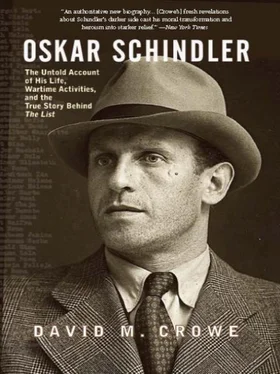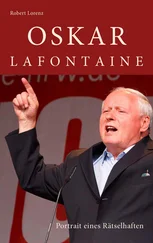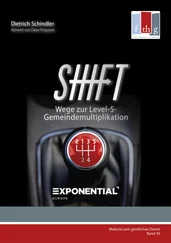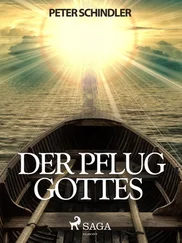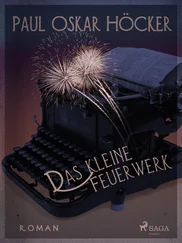Once local police officials completed their investigation, they sent a report of their findings to the Gestapo in Brno. The Gestapo then summoned “Otto Zeiler” (Oskar Schindler) to discuss the case. Schindler, however, failed to appear and, with the invasion of Poland, “went to Poland with the advancing troops and has not been seen in Mährisch Ostrau again.” Schindler, the May 8, 1940, Gestapo report concluded, was still working for Abwehr in Poland or the Balkans. Sliwa remained in Czech police custody until the spring of 1940, when he was handed over to the German police. According to local Gestapo officials, it was now time for the “affair to be brought to a close.” Schindler’s unwillingness to help the Gestapo in its investigation hindered its ability to determine whether Sliwa’s break-in was an act of counterespionage or a common robbery. The Gestapo had no idea at this time what had been stolen from Schindler’s apartment because Oskar refused to talk with them. 40
This report, though, did not end the matter. A second report two days later from Gestapo headquarters in Brno suggested that “Zeiler” be located and that Sliwa, whom a later Gestapo report called an “utterly degenerate, work-shy, irresolute person” (a crime in Nazi Germany), be re-interrogated by the Gestapo. 41After the Gestapo again questioned Sliwa, it sent the matter to the German District Court (deutsches Amtsgericht) for final deliberation. The court ruled that it was difficult to determine whether Schindler’s office was an official Abwehr office or simply a message center office because “Zeiler [Schindler] was only an Abwehr ‘confidant.’” The only way to find out whether “Zeiler’s” office was an office of the Reich would be to contact Major Plathe in Gleiwitz. Until this could be done, Sliwa would remain in German custody. The court noted that the Kripo ( Kriminalpolizei ; criminal police) had located Schindler, who now resided in Kraków at Lipova No. 4, and suggested that “further action regarding Schindler be initiated from there.” 42
This matter passed through judicial channels until it reached the Supreme Judge of the Reich at the People’s Court (Volksgerichtshof) in Berlin. On July 23, 1940, the Supreme Judge’s office requested “what is known about the personality and official duties of engineer Zeiler” from Gestapo officials in Mährisch Ostrau. 43Local court officials responded on August 10 that Sliwa’s break-in was “not of a political nature” and that his claim that he had been recruited by a Polish agent was “merely an excuse.” Sliwa had broken into five homes between June 21 and July 14, 1939, and was now being questioned about each of them. The house on Parkstraße 25–27 “was not occupied by the Gestapo or any other military or civilian service office” but by an Abwehr confidant. As far as the court could tell, “Zeiler” or Schindler, who now lived in Kraków, still worked for Abwehr under Oberstleutnant Plathe. Further investigation indicated that “Schindler alias Zeiler had not stored any important papers in his apartment.” All Sliwa stole were a “few love letters,” five handkerchiefs, a purse containing 170 Czech crowns ($5.80), a lady’s gold wrist watch worth 400 crowns ($13.68), and a piggy bank. 44
The Gestapo, though, disagreed with the People’s Court. The Gestapo office in Brno wrote to its suboffice in Mährisch Ostrau on August 23, 1940, that the “facts of the case unquestionably seem to indicate high treason to the detriment of the Reich.” The documents Sliwa stole from “Engineer Zeiler’s” Abwehr office were of “extraordinary importance to the Polish authorities.” The Gestapo in Brno requested that agents in Mährisch Ostrau question Sliwa again and “present him to the investigative attorney for high treason.” However, it was suggested that the agents not question Schindler because he was “outside the country.” They also urged a “speedy settlement” of the Sliwa matter. 45
The attorney general of the People’s Court in Mährisch Ostrau disagreed with the Gestapo’s conclusion and noted in his final report that Sliwa, a “completely depraved and unprincipled person,” was telling a lie when he claimed that he had been hired by a Polish agent to break into “Zeiler’s” office. When he was dealing with Czech officials, Sliwa admitted to the thefts because “the punishment will not be very severe due to the Czech mentality.” But when he confesses to a German, he hides behind “the assertion that he was induced to do this” because he knew that “German courts proceed harshly, without ceremony, in such matters.” In other words, Sliwa wanted “to shift the guilt for this whole affair into someone else’s shoes.” The attorney general concluded that there was no high treason here and that only “a case of breaking and entering theft” was involved. It ordered that Sliwa be turned over to local Protectorate authorities. 46On October 22, 1940, the District Court in Mährisch Ostrau sentenced Sliwa to eleven months of hard labor. The Gestapo, though, seemed unwilling to accept this decision, and on November 13 requested the transfer of all of the files on Sliwa and the Polish consulate in Mährisch Ostrau to its headquarters in Brno. 47This might explain why Schindler had so much trouble with the Gestapo during his years in Kraków. Certainly the Gestapo in Kraków knew of his unwillingness to cooperate with Gestapo officials in Mährisch Ostrau. This, in turn, probably led to the increased surveillance of a man some in Gestapo headquarters in Brno thought was associated with a robbery involving high treason. Oskar would be arrested by the Gestapo three times in Kraków and Brünnlitz. A few of the arrests were undoubtedly meant to teach a lesson to the man who had earlier proved so uncooperative.
This was not the only attempt by Polish agents to break into the Schindler apartment. On another occasion, a prowler woke Emilie up when he shined his flashlight into the apartment. She was sleeping in the apartment’s office, a converted bedroom, because she and Oskar had just had a fight about his love affair with Irena Dvorzakowa. While Oskar slept blissfully in their bedroom, Emilie took the Luger to the office window and fired two shots into the air inside the office. She saw a shadow disappear outside, and the shots startled the guard, who was sleeping on duty. Again, the suspicion was that a Polish agent had tried to break into the apartment. 48
Our information about Oskar’s activities as an Abwehr agent in Mährisch Ostrau in 1939 comes from various sources: Emilie’s memoirs; the Gestapo reports on the Sliwa robbery; the post-World War II Czechoslovak investigations of Oskar’s activities, which included the testimony of fellow agents; and an Abwehr report on the activities of combat and other Abwehr units in the Těšín area in the months before the invasion of Poland. Oskar also briefly discussed his Abwehr activities with Martin Gosch in an interview in Paris in 1964. As will be seen in more detail in a later chapter, immediately after World War II the Czechoslovakian government began intensive investigations of Sudeten Germans and others who had collaborated with the Third Reich to determine who should be punished for their crimes. Oskar Schindler’s name came up frequently in these investigations. The principal testimony against Oskar came from two Sudeten Germans, Alois Polansky, who worked for Abwehr in Oppa (Czech Opava) and the SD in Mährisch Ostrau, and Joseph “Sepp” Aue, who later worked for Oskar in Kraków. The Abwehr report does not mention Schindler specifically, though that was not all that uncommon because some agents were only mentioned by letters or numbers to disguise their identity.
According to these interrogation reports, Polansky was born in Těšín in 1894. He saw action on the Russian and Italian fronts in the Austrian-Hungarian army during World War I. After the war, he managed a garage until 1938 and joined Abwehr in early 1939. He continued to work for Abwehr throughout the war and held positions in Bratislava (German Pressburg) and Mährisch Ostrau. After the war, the Czechoslovaks sentenced Polansky to fifteen years in prison for his collaboration with the Germans. Polansky’s testimony gives us the most complete picture we have of Oskar’s Abwehr work in the months before the outbreak of World War II. As mentioned earlier, Polansky drove Leutnant György to meet with Oskar on three occasions before Hitler took over Bohemia and Moravia in March 1939. Oskar, who now used the code name OSI, or Zeiler, would meet with György at the Hotel Palace in Moravská Ostrava. On one occasion, which Polansky identifies as possibly March 12, 1939, he drove the two agents to Visolaje in Slovakia, where Oskar and György met with two Abwehr operatives who spoke Czech and Slovak. Schindler translated for Leutnant György. After half an hour, Leutnant György asked Polansky whether he felt it was safe to drive to Bily Kriz (White Cross) in the nearby Beskydy (Beskid) mountains. Polansky thought it was too dangerous because of the snow. The four Abwehr agents told Polansky to stay behind while they took a sleigh to Bily Kriz. Three hours later, György and Oskar returned alone. Polansky later learned that one of the two strangers was from Žilinia, the Slovak staging area for one of the two teams responsible for taking the Jablunkov Pass. 49
Читать дальше
